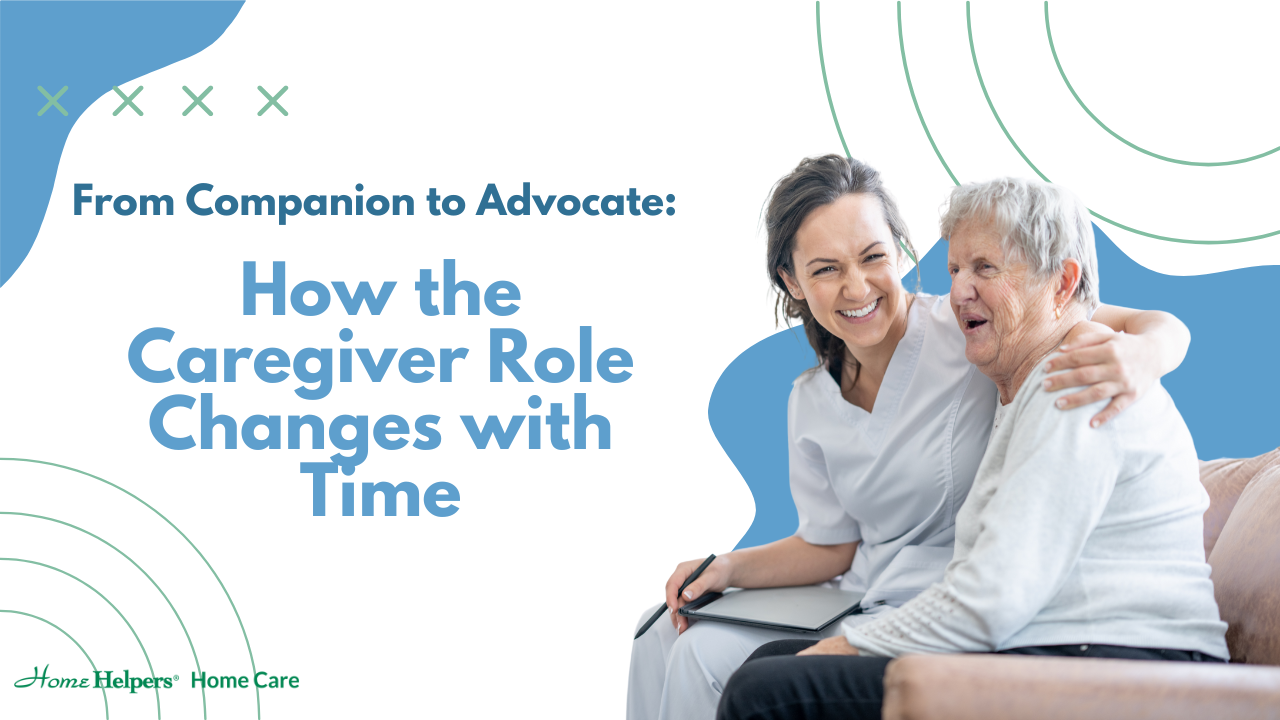From Companion to Advocate: How the Caregiver Role Changes with Time in the Northern Shenandoah Valley

Author: Home Helpers Home Care
Caring for a loved one with dementia or a chronic illness is a deeply personal journey—and one that evolves with time. Whether you're in Winchester, Front Royal, or Purcellville, the progression of care needs often calls for a shift from providing companionship to becoming a full advocate. Recognizing how the caregiver role changes is essential to staying ahead of your loved one’s needs and ensuring they continue to receive compassionate, appropriate care.
Here’s how that evolution typically unfolds and what it may mean for your family in the Northern Shenandoah Valley.
🧩 The Early Stage: A Companion Offering Support
In the beginning, caregiving often looks like emotional support and gentle guidance. Many families start by stepping in as needed—helping with errands, attending appointments, or offering companionship during the day.
- What this stage looks like:
- Helping with light housekeeping or meal prep
- Providing transportation to appointments or community events
- Offering companionship during the day, especially for those living alone
- Gently reminding loved ones to take medications or follow routines
- Challenges: At this stage, it's common to wonder if additional support is really necessary. Many caregivers feel guilt about stepping in, especially if their loved one is relatively independent.
- Pro Tip: Pay attention to changes in mood, memory, and physical stamina. These early signs often indicate that more support will be needed soon, even if the need doesn’t feel urgent yet.
🔄 The Transition: From Companion to Coordinator
As needs increase, the role naturally shifts from being “extra help” to managing more of the day-to-day. You may start taking over certain tasks that used to be shared or independently managed.
- What this stage looks like:
- Assisting with personal care (dressing, bathing, hygiene)
- Coordinating medical appointments and tracking medications
- Ensuring safety by modifying the home or monitoring mobility
- Managing bills or financial responsibilities if cognitive issues arise
- Challenges: Caregivers in this stage often report feeling overwhelmed, especially if they’re balancing work, family, and caregiving responsibilities.
- Pro Tip: Start building a support team. Reach out to local resources in the Northern Shenandoah Valley, such as community health programs, caregiver support groups, or in-home care agencies like Home Helpers.
⏳ The Later Stage: Becoming a Full-Time Advocate
Eventually, caregiving may become a full-time responsibility—one that requires skill, endurance, and a deep understanding of the medical and emotional needs of your loved one.
- What this stage looks like:
- Managing all aspects of daily life, including feeding, toileting, and mobility
- Responding to medical emergencies or behavioral changes
- Coordinating with hospice or palliative care providers if appropriate
- Advocating for your loved one’s preferences and dignity when they can no longer speak for themselves
- Challenges: Full-time caregiving is physically and emotionally taxing. Caregivers often experience burnout, especially if they try to do it all without help.
- Pro Tip: Accepting outside help isn’t a failure—it’s a strength. Professional caregivers can support your efforts while preserving your own health and your loved one’s dignity.
🤝 How Home Helpers Home Care of Northern Shenandoah Valley Can Help
Care needs don’t just grow—they evolve. That’s why Home Helpers Home Care of Northern Shenandoah Valley offers flexible, compassionate care tailored to every stage of the caregiving journey.
- Personalized Care Plans: Whether you’re looking for part-time companionship or full-time care, we design a care plan based on your loved one’s evolving needs.
- Trained Caregivers: Our team is trained in Alzheimer’s and dementia care, personal care, and specialized assistance for chronic conditions.
- Local Support: We proudly serve families across Winchester, Front Royal, Purcellville, and surrounding areas—bringing consistency, familiarity, and peace of mind to every home.
- Respite Care: Even full-time caregivers need time to recharge. We offer respite care services to give you a break without sacrificing quality.
With Home Helpers, you’re not alone. We partner with families to provide the expert care your loved one needs—and the peace of mind you deserve.
💬 Final Thoughts
Caregiving is a role that changes—sometimes subtly, sometimes drastically. From light companionship to full-time advocacy, each phase brings new responsibilities, challenges, and rewards. Recognizing those shifts early allows you to be proactive, seek the right support, and maintain balance in your own life.
If your caregiving journey is starting to shift—or already has—don’t wait to ask for help.
Call Home Helpers Home Care of Northern Shenandoah Valley today at (540) 771-2555 to schedule a free care assessment and see how we can support you and your loved one.
Sources:
- Alzheimer’s Association. (2024). Understanding Caregiving
- Mayo Clinic. (2023). Caregiver Stress: Tips for Taking Care of Yourself
National Institute on Aging. (2023). Caring for a Person with Alzheimer’s Disease
